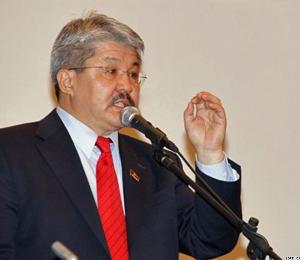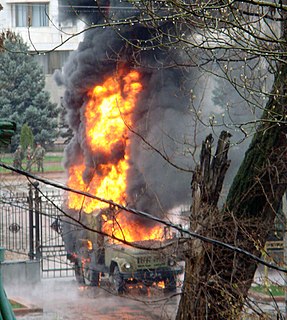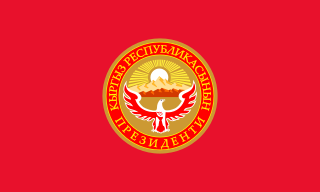
The history of the Kyrgyz people and the land now called Kyrgyzstan goes back more than 2,000 years. Although geographically isolated by its mountainous location, it had an important role as part of the historical Silk Road trade route. In between periods of self-government it was ruled by Göktürks, the Uyghur Empire, and the Khitan people, before being conquered by the Mongols in the 13th century; subsequently it regained independence but was invaded by Kalmyks, Manchus and Uzbeks. In 1876 it became part of the Russian Empire, remaining in the USSR as the Kirghiz Soviet Socialist Republic after the Russian Revolution. Following Mikhael Gorbachev's democratic reforms in the USSR, in 1990 pro-independence candidate Askar Akayev was elected president of the SSR. On 31 August 1991, Kyrgyzstan declared independence from Moscow, and a democratic government was subsequently established.

The Politics of Kyrgyzstan, officially known as the Kyrgyz Republic takes place in the framework of a parliamentary representative democratic republic, whereby the President is head of state and the Prime Minister of Kyrgyzstan is head of government. Executive power is exercised by the government. Legislative power is vested in both the government and parliament. The Economist Intelligence Unit has rated Kyrgyzstan as "hybrid regime" in 2016.

The Tulip Revolution or First Kyrgyz Revolution led to President of Kyrgyzstan, Askar Akayev's fall from power. The revolution began after parliamentary elections on February 27 and March 13, 2005. The revolutionaries alleged corruption and authoritarianism by Akayev, his family and supporters. Akayev fled to Kazakhstan and then to Russia. On April 4, 2005, at the Kyrgyz embassy in Moscow, Akayev signed his resignation statement in the presence of a Kyrgyz parliamentary delegation. The resignation was ratified by the Kyrgyz interim parliament on April 11, 2005.

The Social Democratic Party of Kyrgyzstan is a political party in Kyrgyzstan. Members formed the party on 1 October 1993, but did not register with the Justice Ministry until 16 December 1994. Abdygany Erkebaev served as the party's first chairman. Almazbek Atambayev replaced him on 30 July 1999. The majority of the party's membership is drawn from the country's entrepreneurs.

Almazbek Sharshenovich Atambayev is a Kyrgyz politician who served as the President of Kyrgyzstan from 1 December 2011 to 24 November 2017. He was Prime Minister of Kyrgyzstan from 17 December 2010 to 1 December 2011, and from 29 March 2007 to 28 November 2007. He served as Chairman of the Social Democratic Party of Kyrgyzstan (SDPK) from 30 July 1999 to 23 September 2011.

Kazakhstan–Kyrgyzstan relations refers to the bilateral diplomatic relations between the Republic of Kazakhstan and the Kyrgyz Republic. Bilateral relationships between the countries are very strong and Kyrgyz and Kazakh are very close in terms of language, culture and religion. Kyrgyz-Kazakh relationships have always been at very high level and economic and other formal unification of two countries have been greeted with strong appreciation by both nations since the two share a lot in common. On April 26, 2007 the presidents of Kazakhstan and Kyrgyzstan signed an agreement to create an "International Supreme Council" between the two states. This historic event took place during an official visit of the Kazakh president to the Kyrgyzstan capital, Bishkek. Kazakhstan’s direct investment in the Kyrgyz economy has been rapidly gaining pace since the early 2000s. Today Kazakhstan’s economic presence is felt throughout northern Kyrgyzstan, from banks to small businesses, cars with Kazakh plates and numerous tourists. For the most, the Kyrgyz are welcoming these trends as both countries share a similar culture and traditions. During the last five years Kazakhstan invested about 400 million dollars in Kyrgyzstan and is considered the largest investor. Thirty-three percent of the total Kyrgyzstan bank's equity belongs to Kazakh investors. There are about 2,000 enterprises functioning in Kyrgyzstan, and 500 belong to Kazakh entrepreneurs. Kazakh-Kyrgyz unification is in the economic interests of both countries. "I do not see any problem in unification with another country. In the future we should unite with this or another state, anyway. Unification with Kazakhstan will be a good accelerator for our economic development," said lawmaker Juraev.

Bakyt Beshimov is a leader of parliamentary fraction and deputy chairman of Social Democratic Party of Kyrgyzstan. Bakyt Beshimov is a prominent opposition leader, famous for his liberal views, and speaking out against Kurmanbek Bakiyev's and Askar Akayev's regimes.

A presidential election was held in Kyrgyzstan on 23 July 2009. The date was set after the constitutional court ruled that the extension of the presidential term from four to five years did not apply until the next presidential election, calling for elections by 25 October 2009; in response, a parliament committee proposed the July election date, which was then passed by the incumbent president Kurmanbek Bakiyev's Ak Jol-dominated parliament. Bakiyev had previously announced his intention to run for reelection. Bakiyev was re-nominated on 1 May 2009.

A constitutional referendum was held in Kyrgyzstan on 27 June 2010 to reduce presidential powers and strengthen democracy in the wake of the riots earlier in the year. Parliamentary elections followed on 10 October 2010.

Early parliamentary elections were held in Kyrgyzstan on 10 October 2010. All 120 seats of the Supreme Council were elected by the party list system. Seats were allocated to all parties who obtained more than 5% of the vote and more than 0.5% in each of the nine provinces, capped at 65 seats per party.

The Kyrgyz Revolution of 2010, also known as the Second Kyrgyz Revolution, the April Events or officially as the People's April Revolution, began in April 2010 with the ousting of Kyrgyz president Kurmanbek Bakiyev in the capital Bishkek. It was followed by increased ethnic tension involving Kyrgyz people and Uzbeks in the south of the country, which escalated in June 2010. The violence ultimately led to the consolidation of a new parliamentary system in Kyrgyzstan.

The current constitution of Kyrgyzstan was passed by referendum on June 27, 2010, replacing the previous constitution. It introduced a strong parliament to the country, reducing the power of the historically strong president. The constitution is similar in many ways to the previous one.

Ata-Zhurt, sometimes Ata-Jurt,, or Fatherland, was a political party in Kyrgyzstan. Its political base was in the south of the country, but the party was headquartered in the capital Bishkek. The party was led by Kamchybek Tashiyev, and supported the ousted former President Kurmanbek Bakiyev. The party ceased to exist in 2014, when it merged with Respublika.

Ömürbek Toktogulovich Babanov is a Kyrgyz politician who was Prime Minister of Kyrgyzstan from 1 December 2011 to 1 September 2012. Before his appointment as Prime Minister, he was Deputy Prime Minister in the Government of Almazbek Atambayev. He was also acting Prime Minister from 23 September 2011 until 14 November 2011, as the Prime Minister Atambayev was a candidate in the presidential election. He again became acting Prime Minister on 1 December 2011 when Atambayev took office as President. He was confirmed by Parliament on 23 December 2011. On 1 September 2012 Babanov resigned as Prime Minister.
The following lists events that happened during 2010 in Kyrgyzstan.

Sooronbay Sharipovich Jeenbekov is a Kyrgyz politician, and the President of Kyrgyzstan. He officially took office on 24 November 2017. He was also the Prime Minister of Kyrgyzstan from April 2016 to August 2017.

Presidential elections were held in Kyrgyzstan on 15 October 2017. Incumbent President Almazbek Atambayev was not allowed to run again because the constitution sets a single six-year term for the head of state. Eleven candidates registered for the race, and from this field Sooronbay Jeenbekov of the Social Democratic Party of Kyrgyzstan won more than 50% of the vote, avoiding a runoff. Following certification of the results on 30 October, Jeenbekov was inaugurated as President of Kyrgyzstan on 24 November. The election, though not without flaws, was Central Asia’s first ever truly competitive election.
Events from the year 2017 in Kyrgyzstan



















